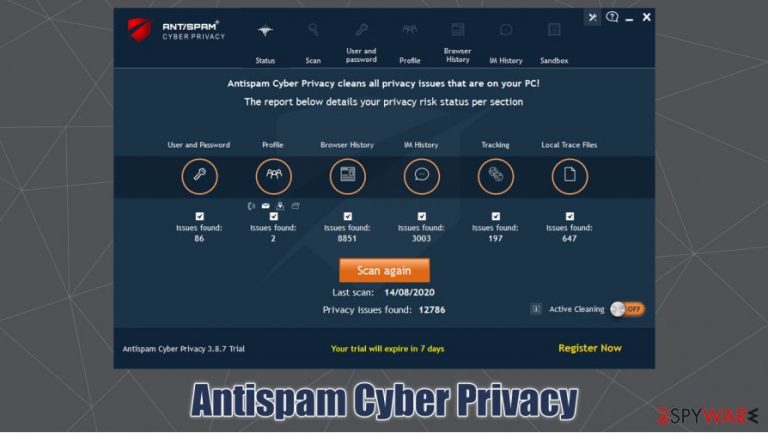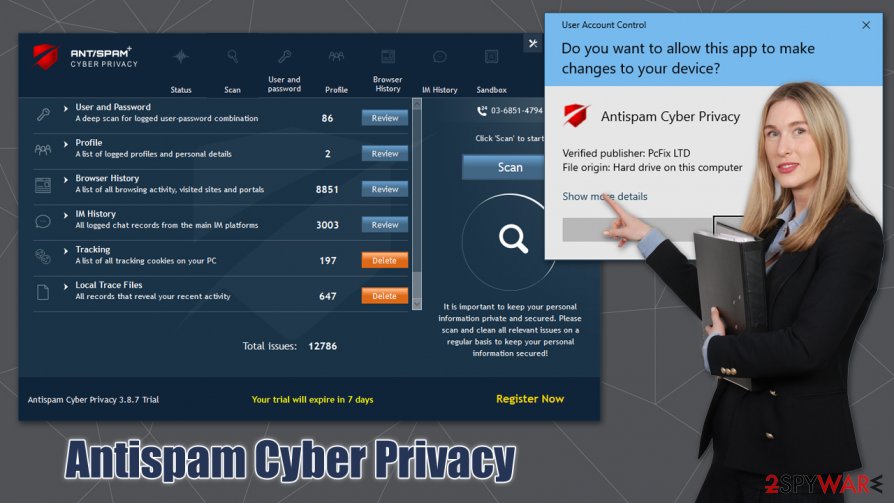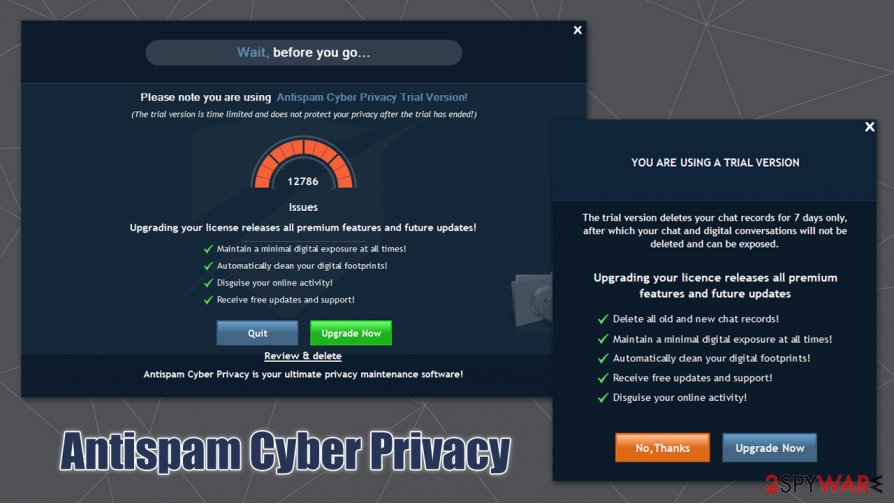Antispam Cyber Privacy (Removal Guide) - Free Instructions
Antispam Cyber Privacy Removal Guide
What is Antispam Cyber Privacy?
Antispam Cyber Privacy is a deceptive application that shows users intrusive popups on a daily basis

Antispam Cyber Privacy is a potentially unwanted program[1] that is presented as a useful tool that can protect users' online privacy by deleting cookies, browser history, and checking for insecure passwords, as well as other items. While many might think that the app is useful due to these features, it is important to note that it uses misleading tactics to make users purchase its full license.
The scan uses typical scare tactics to make consumers believe that their computer issues (in this case, online privacy issues) – they are shown thousands of issues that allegedly need to be fixed. However, the picked-up items are mere browser history entries that do not pose any harm. Once users want to delete the seemingly private information that is presented to them, they are explained that they are using Antispam Cyber Privacy Trial and that they should purchase a full version before they can delete cookies, internet history, and other online traces.
| Name | Antispam Cyber Privacy |
| Type | Potentially unwanted program |
| Developer | Glitz Marketing Solutions |
| Distribution | Official website, software bundles |
| Operating system | Windows |
| Supposed functionality | Protects online privacy by deleting all the online footprints from browsers and a PC |
| Real purpose | Shows false-positives in order to make users believe that their privacy is exposed to dangers, regardless of the actual situation; shows popups that ask to upgrade Antispam Cyber Privacy to licensed version via the established scheduled task |
| Elimination | Uninstall the PUP by following our manual guide provided below and then perform a full system scan with anti-malware software |
| System fix | To ensure that your Windows is working at its full capacity and does not crash, we recommend using FortectIntego for system maintenance and virus damage removal |
While Antispam Cyber Privacy can be found on its official website, it is most usually ends up on users' machines without asking for direct permission. This is because software bundling is often used to promote such apps, so they rarely notice the point of entry. Additionally, users might also install the app after seeing an attractive or deceptive advertisement on various websites.
During the installation Antispam Cyber Privacy changes a variety of Windows system settings (to delete tracers of these and similar modifications on Windows systems automatically, we recommend using FortectIntego). For example, it creates a scheduled task to show popups that remind users to buy a license for the program.
Once the installation process is complete, the Antispam Cyber Privacy virus performs a full system scan, which identifies the alleged privacy issues. It also displays used profiles, passwords, and other personal data. Therefore, the program essentially can read all your personal information that you keep on your PC.
Even those who would want to delete the alleged traces, they would not be able to, as it turns out, Antispam Cyber Privacy Trial is not a trial at all, as it does not provide any functions apart from displaying thousands of fake entries. Trials are meant to be used for users to experience the app functionality, not to mislead them into buying a useless application. Thus, do not waste your money and perform Antispam Cyber Privacy removal instead.

If anything, the app might result in personal data compromise instead of its protection – almost 30 security vendors detect the Antispam Cyber Privacy as unsafe, deceptive, or even malicious under the following names on Virus Total:[2]
- Application.Deceptor.AST
- Program.Unwanted.4789
- PUP.Optional.AntispamCyberPrivacy
- Misleading:Win32/Lodi
- PUA.Superfluss
- Trojan.Win32.Generic!BT
- Win32:Malware-gen, etc.
Therefore, we do not recommend you use it and instead remove Antispam Cyber Privacy from your system immediately. Deleting your online traces such as cookies is a good practice, as it prevents marketing companies or websites from tracking you for months or even years. However, if you want to delete such data about yourself automatically, you should look for more reputable applications for the purpose (for example, some anti-malware solutions offer the same functionality).
You can uninstall Antispam Cyber Privacy manually as per the instructions we provide below. However, you can also eliminate it by using reputable anti-malware software capable of detecting potentially unwanted programs. This way, you will not have to deal with unwanted popups, ads, redirects, misleading scan results, and other dangerous activities that PUPs are related to.
Learn to install new applications correctly
In most cases, users install all sorts of suspicious apps unintentionally – tech forums, Reddit, and other community platforms are flooded with complaints about seemingly invisible infiltration of various adware/malware programs. However, while it might come as a surprise, 99% of the time, consumers install these apps themselves, even though they are tricked into doing so.
Software bundling is a very successful distribution technique that is used by various software developers (even legitimate ones). However, there are various scenarios on how the optional components within the installer are presented. Most commonly, deceptive websites or freeware authors are deliberately trying to hide PUPs within the installation wizard to make users install apps unintentionally, as more installs equal more profits.
However, you can always prevent this type of infiltration, and you don't need to be a pro at IT – all you have to do is pay close attention hat you are doing. Here are some tips provided by security researchers from novirus.uk:[3]
- If possible, install apps from official sources instead of third-parties;
- Pay attention to the installation process – read instructions and don't skip steps;
- Install anti-malware capable of detecting PUPs;
- Watch out for misleading button placements, offers, deals, pre-ticked boxes, and other tricks;
- Always opt for Advanced/Custom installation settings instead of Recommended/Quick ones.

Do not trust deceptive apps like Antispam Cyber Privacy – uninstall them ASAP
Exaggerated scan results or misleading statements are one of the most common forms of online scam. Unfortunately, many app developers also choose to go that path and make users waste money on programs they do not need or want. Therefore, we highly recommend you remove Antispam Cyber Privacy from your system and trust reputable applications instead.
Antispam Cyber Privacy removal can be performed manually, the same way any other program is uninstalled – via the Control Panel. If you are not sure about this process, we prepared a detailed guide for you below. Nonetheless, you can always pick an automatic elimination method with the help of anti-malware software that can do the job for you and delete Antispam Cyber Privacy, among other PUPs or malware, from your system quickly.
You may remove virus damage with a help of FortectIntego. SpyHunter 5Combo Cleaner and Malwarebytes are recommended to detect potentially unwanted programs and viruses with all their files and registry entries that are related to them.
Getting rid of Antispam Cyber Privacy. Follow these steps
Uninstall from Windows
Delete Antispam Cyber Privacy from Windows by following this guide:
Instructions for Windows 10/8 machines:
- Enter Control Panel into Windows search box and hit Enter or click on the search result.
- Under Programs, select Uninstall a program.

- From the list, find the entry of the suspicious program.
- Right-click on the application and select Uninstall.
- If User Account Control shows up, click Yes.
- Wait till uninstallation process is complete and click OK.

If you are Windows 7/XP user, proceed with the following instructions:
- Click on Windows Start > Control Panel located on the right pane (if you are Windows XP user, click on Add/Remove Programs).
- In Control Panel, select Programs > Uninstall a program.

- Pick the unwanted application by clicking on it once.
- At the top, click Uninstall/Change.
- In the confirmation prompt, pick Yes.
- Click OK once the removal process is finished.
After uninstalling this potentially unwanted program (PUP) and fixing each of your web browsers, we recommend you to scan your PC system with a reputable anti-spyware. This will help you to get rid of Antispam Cyber Privacy registry traces and will also identify related parasites or possible malware infections on your computer. For that you can use our top-rated malware remover: FortectIntego, SpyHunter 5Combo Cleaner or Malwarebytes.
How to prevent from getting adware
Choose a proper web browser and improve your safety with a VPN tool
Online spying has got momentum in recent years and people are getting more and more interested in how to protect their privacy online. One of the basic means to add a layer of security – choose the most private and secure web browser. Although web browsers can't grant full privacy protection and security, some of them are much better at sandboxing, HTTPS upgrading, active content blocking, tracking blocking, phishing protection, and similar privacy-oriented features. However, if you want true anonymity, we suggest you employ a powerful Private Internet Access VPN – it can encrypt all the traffic that comes and goes out of your computer, preventing tracking completely.
Lost your files? Use data recovery software
While some files located on any computer are replaceable or useless, others can be extremely valuable. Family photos, work documents, school projects – these are types of files that we don't want to lose. Unfortunately, there are many ways how unexpected data loss can occur: power cuts, Blue Screen of Death errors, hardware failures, crypto-malware attack, or even accidental deletion.
To ensure that all the files remain intact, you should prepare regular data backups. You can choose cloud-based or physical copies you could restore from later in case of a disaster. If your backups were lost as well or you never bothered to prepare any, Data Recovery Pro can be your only hope to retrieve your invaluable files.
- ^ Potentially unwanted program. Wikipedia. The free encyclopedia.
- ^ AntispamCyberPrivacySetup. Virus Total. File and URL analyser.
- ^ Novirus. Novirus. Cybersecurity news and malware insights.
